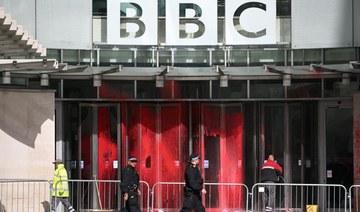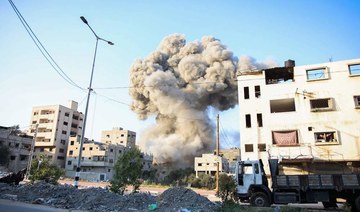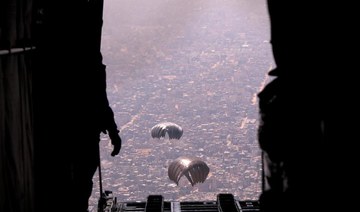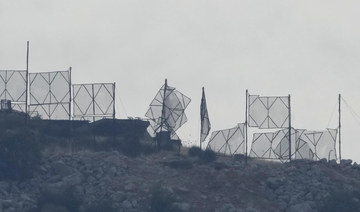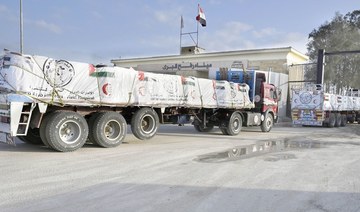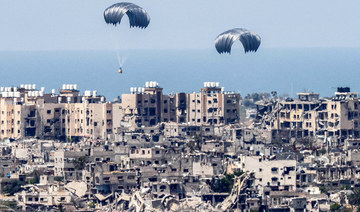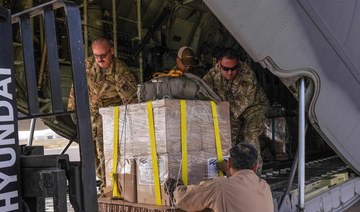JERUSALEM: Palestinian family was evicted from a home in east Jerusalem near the Old City on Wednesday after Israeli settlers won a court battle that stretched more than two decades, activists said.
The apartment in the Palestinian neighborhood of Silwan was home to a 53-year-old woman and her four children, according to Israeli NGO Peace Now, which opposes Israeli settlement expansion.
Police arrived and evicted the residents from the apartment and they will at least temporarily stay with relatives.
An Israeli court found that the Elad foundation, which seeks to increase the Jewish presence in mainly Palestinian east Jerusalem, had legally purchased that portion of the property and ruled in its favor.
“To take us from the house is like taking my heart from my body,” one of the Palestinian residents, Ali Siyam, 20, told AFP.
Elad said in a statement “the property was purchased by Jewish people in accordance with the law, in good faith and in a fair and legal transaction.”
It added that “three separate courts verified that the property was lawfully purchased by Jews.”
The foundation, known in English as the City of David foundation, also oversees a nearby archaeological center in Silwan that seeks to demonstrate Jews’ historical connection to Jerusalem.
It was in the news recently when US officials attended an inauguration of an archaeological project it organized in Silwan, another break with traditional diplomatic practice by President Donald Trump’s White House that drew Palestinian outrage.
Their attendance was seen as further US recognition of Israeli sovereignty over east Jerusalem.
Palestinians say Israel and groups such as Elad are on a systematic campaign to force them out of Jerusalem.
Israel occupied east Jerusalem in the 1967 Six-Day War and later annexed it in a move never recognized by the international community.
It sees the entire city as its capital, while the Palestinians view the eastern sector as the capital of their future state.
East Jerusalem includes highly sensitive holy sites for Christians, Muslims and Jews that are located in the Old City near Silwan.
Some 600,000 Israeli settlers now live in the occupied West Bank and east Jerusalem among around 2.9 million Palestinians.
Peace Now said in a statement “the settlement in Silwan not only harms the prospects for a conflict-ending agreement and stability in Jerusalem, it is also cruel and evil.”
It accused the settlers of “using their power and money to exhaust and impoverish the Palestinian families in legal proceedings so that they will have to agree to sell them homes.”
Israeli settlers take over east Jerusalem home after court battle
Israeli settlers take over east Jerusalem home after court battle
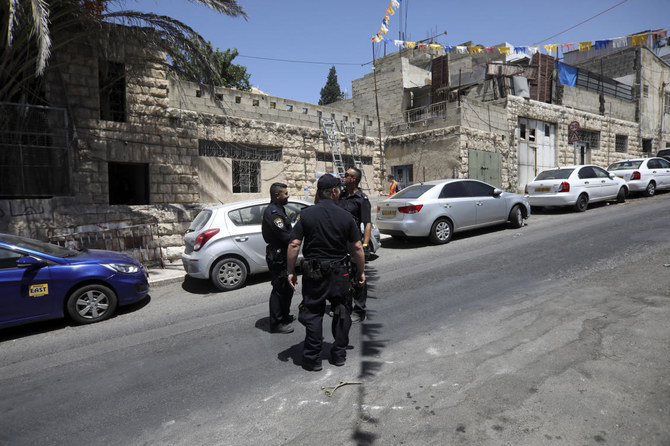
- The apartment in the Palestinian neighborhood of Silwan was home to a 53-year-old woman and her four children
Algerian reporter says he was expelled from his country without explanation
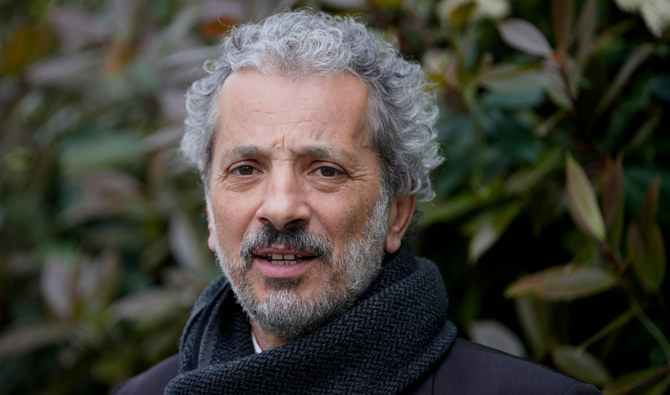
- Farid Alilat wrote on Facebook he spent 11 hours in police custody at the airport before being boarded onto a plane and sent to France
ALGIERS: An Algerian journalist was expelled from the country after flying in from France and not being allowed to leave the airport as journalists continue to face challenges reporting in Algeria.
Farid Alilat, a writer for the French-language magazine Jeune Afrique, wrote on Facebook that he spent 11 hours in police custody on Saturday at the airport before being boarded onto a plane and sent to France, where he has a residency permit.
Alilat said he regularly takes flights from Paris to Algiers to report on Algeria, where he has for years been a well-known journalist due to his work for French-language daily newspapers including Liberté, which was shuttered in 2022 amid financial problems and scuffles with the government and Algeria’s state-owned oil company, both of which are major advertisers for the country’s newspapers.
In a lengthy post in which he wrote of his deportation as if he were reporting on it, Alilat alleged that police officers on the tarmac in Algiers told him that they were acting on orders “from above.”
He said he was interrogated about his travels, who he has met with and about Jeune Afrique, which Algerian authorities believe favors their neighbor and regional rival, Morocco. Few Algerian media outlets reported on Alilat’s expulsion and few politicians commented on it. Former Communications Minister Abdelaziz Rahabi called it “a measure from another era that serves neither the people nor the government.”
“No one can be arbitrarily deprived of the right to enter their own country,” he wrote on Facebook.
The episode is the latest instance of Algeria’s government restricting journalists from reporting in Algeria and comes while high-profile journalists, including editors Ihsane El Kadi and Mustapha Benjama remain in prison on charges related to using foreign funds to finance journalism and disrupting public order. The government, however, has also resumed granting authorizations to journalists starting new media outlets or television shows and last year passed a law enshrining new protections for journalists.
Israeli tanks push back in northern Gaza Strip, warplanes hit Rafah
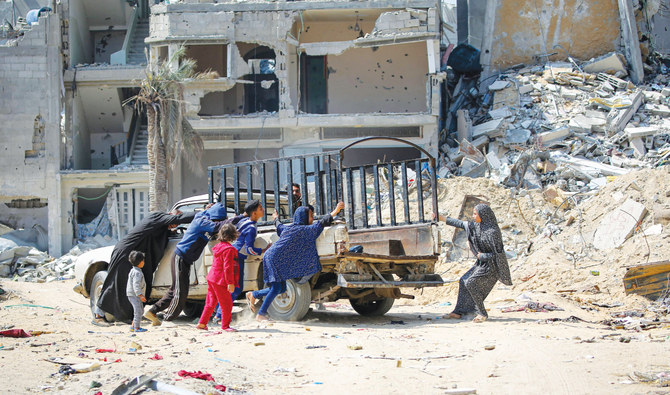
- Israel obstructing access to victims of Hamas Oct. 7 attack: UN probe
GENEVA/CAIRO: Israeli tanks pushed back into some areas of the northern Gaza Strip on Tuesday which they had left weeks ago, while warplanes conducted airstrikes on Rafah, the Palestinians’ last refuge in the south of the territory, killing and wounding several people, medics and residents said.
Residents reported an internet outage in the areas of Beit Hanoun and Jabalia in northern Gaza.
Tanks advanced into Beit Hanoun and surrounded some schools where displaced families have taken refuge, said the residents and media outlets of the militant Palestinian group Hamas.
“Occupation soldiers ordered all families inside the schools and the nearby houses where the tanks had advanced to evacuate.
The soldiers detained many men,” one resident of northern Gaza said via a chat app.
Beit Hanoun, home to 60,000 people, was one of the first areas targeted by Israel’s ground offensive in Gaza last October.
Heavy bombardment turned most of Beit Hanoun, once known as “the basket of fruit” because of its orchards, into a ghost town comprising piles of rubble.
Many families who had returned to Beit Hanoun and Jabalia in recent weeks after Israeli forces withdrew, began moving out again on Tuesday because of the new raid, some residents said.
Palestinian health officials said in one strike, Israel killed four people and wounded several others in Rafah, where over half of Gaza’s 2.3 million people are sheltering and bracing for a planned Israeli ground offensive into the city, which borders Egypt.
The Israeli military said its forces continued to operate in the central Gaza Strip and that they had killed several gunmen who attempted to attack them.
“Furthermore, over the past day, IDF fighter jets and aircraft destroyed a missile launcher along with dozens of terrorist infrastructure, terror tunnels, and military compounds where armed Hamas terrorists were located,” it added.
In Al-Nusseirat refugee camp in the central Gaza Strip, residents said Israeli planes had bombed and destroyed four multi-story residential buildings on Tuesday.
Israel is still imposing “unlawful” restrictions on humanitarian relief for Gaza, the UN human rights office said on Tuesday, despite assertions from Israel and others that barriers have eased.
The amount of aid now entering Gaza is disputed, with Israel and Washington saying aid flows have risen in recent days but UN agencies say it is still far below bare minimum levels.
The Palestinian Health Ministry said 33,843 Palestinians have so far been killed by Israeli fire since Oct. 7, including 46 in the past 24 hours.
Israel is preventing UN investigators from speaking to witnesses and victims of the Oct. 7 attack, former UN rights chief Navi Pillay, who is chairing a three-person probe, said.
The unprecedented Commission of Inquiry was established by the UN Human Rights Council in May 2021 to investigate alleged violations of international humanitarian and human rights law in Israel and the Palestinian territories.
“I deplore the fact that people inside Israel who wish to speak to us are being denied that opportunity, because we cannot get access into Israel,” Pillay said.
The investigation briefed diplomats at the UN in Geneva on its work and said that since Oct. 7, it had focused on the Gaza war between Israel and Hamas.
“So far as the government of Israel is concerned, we have faced not merely a lack of cooperation but active obstruction of our efforts to receive evidence from Israeli witnesses and victims to the events that occurred in southern Israel,” said Chris Sidoti, one of the three members of the inquiry.
The Gaza war began with Hamas’s attack against Israel which resulted in the deaths of 1,170 people, mostly civilians, according to Israeli figures.
The militants also took about 250 hostages, of whom Israel estimates 129 remain in Gaza, including 34 who are presumed dead.
Pillay, 82, a South African former High Court judge, said the commission was investigating alleged crimes during the Hamas attack as well as some allegedly committed by Israeli forces in the Gaza Strip and in the West Bank.
Sidoti, speaking via video-link, said the investigation had found it difficult to collect evidence from large numbers of witnesses.
Israel kills local Hezbollah commander in Lebanon strike
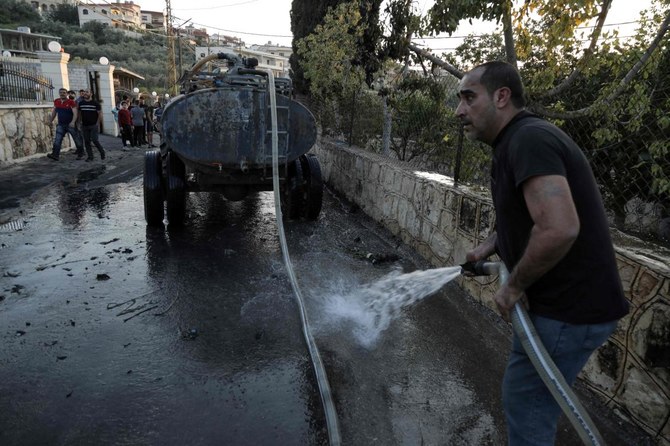
- Hezbollah said in a statement that Ismail Yusef Baz had been killed, without mentioning his rank or role
- Aircraft also hit “Hezbollah military structures and terrorist operatives” elsewhere in south Lebanon on Tuesday, Israeli military said
BEIRUT: An Israeli strike Tuesday killed a local Hezbollah commander in south Lebanon, the Israeli army said, with the Iran-backed group saying three of its members were killed and launching rockets in retaliation.
Israel and Hamas ally Hezbollah have been exchanging near-daily cross-border fire since the Palestinian militant group attacked southern Israel on October 7, triggering war in the Gaza Strip.
Tuesday’s exchanges came with regional tensions high after Iran launched missile and drone attacks on Israel over the weekend in retaliation for a deadly Israeli strike on Tehran’s consulate in Damascus.
The Israeli military said its “aircraft struck and eliminated Ismail Yusef Baz, the commander of Hezbollah’s coastal sector,” adding he was killed in south Lebanon’s Ain Baal area.
Aircraft also hit “Hezbollah military structures and terrorist operatives” elsewhere in south Lebanon on Tuesday, it said in a separate statement.
Lebanon’s official National News Agency (NNA) reported one dead in an Israeli strike on a car in Ain Baal, about 15 kilometers (nine miles) from the border.
Hezbollah said in a statement that Baz had been killed, without mentioning his rank or role, while a source close to the group told AFP that “the field commander in charge of the Naqura region” had been killed “in an Israeli strike.”
The NNA also said an “enemy strike” targeted two cars in Shehabiya, about 10 kilometers from Ain Baal, reporting an unspecified number of dead and wounded.
Hezbollah later said that two more of its fighters had been killed, while its ally the Amal movement announced one dead in Ain Baal.
Hezbollah said it launched rockets at several Israeli military bases “in response to the Israeli enemy’s attacks” on Lebanese villages, in particular Ain Baal and Shehabiya.
Earlier Tuesday, Hezbollah had said its fighters launched an “air attack with suicide drones in two phases... striking the Iron Dome (air defense system) platforms and their crew” in the Beit Hillel area.
The Israeli military said “two armed” drones entered from Lebanon and exploded near Beit Hillel, with local Israeli authorities saying three people were wounded.
On Monday, Hezbollah targeted Israeli troops with explosive devices, wounding four soldiers who crossed into Lebanese territory, the first such attack in six months of clashes.
The violence has killed at least 368 people in Lebanon, mostly Hezbollah fighters but also including at least 70 civilians, according to an AFP tally.
In Israel, the military says 10 soldiers and eight civilians have been killed since hostilities began.
Tens of thousands of civilians have fled their homes on both sides of the border, with the violence fueling fears of all-out conflict between Hezbollah and Israel, which last went to war in 2006.
Gaza’s 2m Palestinians now a population of ‘survivors,’ UN humanitarian chief says
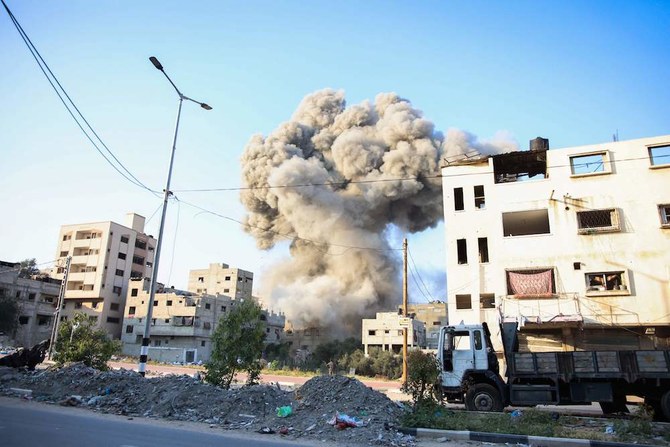
- Andrea De Domenico says the situation in the territory during Israel’s continuing war against Hamas is ‘dire, tense and very volatile’
- He warns it will ‘take years’ for Gaza’s 625,000 students to return to their studies as every university is destroyed and schools have been closed since the war began
LONDON: The 2 million Palestinians who live in the Gaza Strip can now be accurately described as a population of “survivors,” a UN humanitarian chief said on Tuesday.
Andrea De Domenico, head of the UN’s Office for the Coordination of Humanitarian Affairs operations in the Occupied Palestinian Territories, said the situation in Gaza during Israel’s continuing war against Hamas is “dire, tense and very volatile.”
The OCHA is “making all effort possible” to deliver aid to the territory, he added, but “the reality is that there is very little that we can bring to inside Gaza to tackle displacement and battle the looming famine.”
De Domenico said that if the widely predicted famine in Gaza comes to pass, it would be “completely man-made and preventable.”
He added that while there have been recent additional efforts by the UN, and by the Israelis “to some extent,” to increase the amount of aid entering northern Gaza, the worst-affected part of the territory, the situation would require a “massive operation” simply to reach the “minimum standard” of aid that is needed, which is something the OCHA is not in a position to mount at this time.
On Sunday, the agency said Israel “impeded or denied access” to 41 percent of UN-coordinated aid missions in northern Gaza between April 6 and 12.
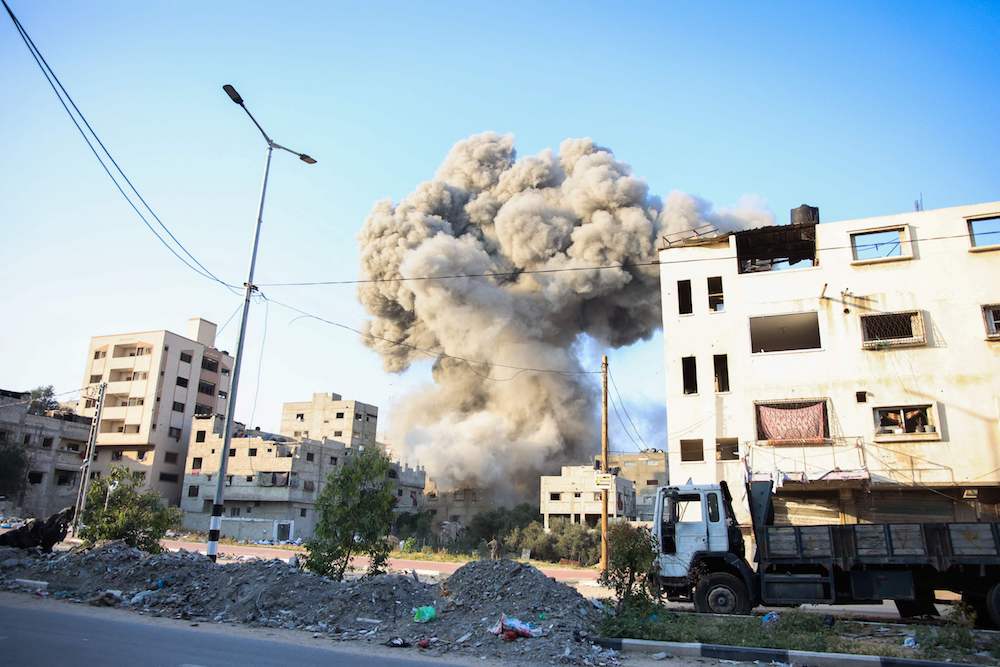
De Domenico also highlighted the “problematic situation” in and around hospitals in Gaza, especially at Al-Shifa where heavy fighting has caused widespread damage and destruction, which he said was proving to be another major obstacle to the delivery of aid and other relief supplies.
“Our team entered (Al-Shifa hospital) in the following days (after the fighting) and have had to deal with a scene of terror; the hospital is completely dysfunctional at this moment,” he said.
“The number of bodies that have been buried in or on the premises of Al-Shifa, or around the hospital, has also been problematic, to the point that UN and Palestinian colleagues have helped the families to start to recognize the remnants of the corpses.”
Also on Tuesday, it was revealed that relentless Israeli airstrikes have destroyed every university in Gaza. This, coupled with the fact that all schools in the territory have been closed since Israel launched its military offensive in October, means it will “take years” for the enclave’s 625,000 students to return to their studies, De Domenico said.
On Monday, the UN’s humanitarian coordinator for the Occupied Palestinian Territories, Jamie McGoldrick, said about 800,000 Palestinians might be forced to flee Gaza if the Israeli military goes ahead with a threatened ground incursion in the southern city of Rafah, close to the border with Egypt, which has become the final refuge for hundreds of thousands of people displaced by fighting in other parts of the territory.
He added that about 90 percent of approximately 4,000 buildings located along Gaza’s eastern border with Israel have been destroyed or damaged during the war, according to the UN Satellite Center.
Jordan completes six more airdrops of aid to northern Gaza
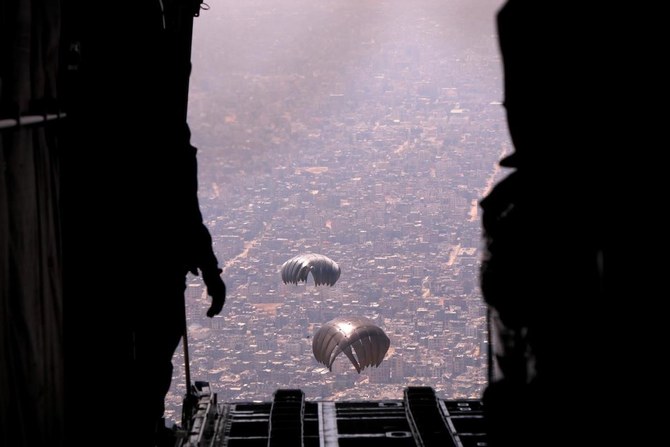
- Jordan has carried out 84 humanitarian airdrops independently, 190 in collaboration with other countries
AMMAN: Jordan’s armed forces completed another six airdrops of food aid to the northern Gaza Strip on Tuesday.
The humanitarian operation was carried out by the Royal Jordanian Air Force, using aircraft provided by Egypt, the US and Germany, the Jordan News Agency reported.
Since the start of Israel's war on Gaza in October, Jordan has completed 84 humanitarian airdrops of its own and 190 in collaboration with other countries.
During an interview with CNN in March, Queen Rania explained why authorities in the country had decided to take action to help people in an area the UN reports to be suffering from the effects of a widespread and severe food crisis.
“We found that after trying so hard in vain to persuade Israel to open the land-access points, we had to do something. We couldn’t just sit idle and watch people starving,” she said.
The airdrops are desperate measures to address a desperate situation, the queen added, describing them as mere “drops in an ocean of unmet needs.”
The Jordanian army said it remains committed to assisting efforts to deliver humanitarian aid to Gaza, in solidarity with the Palestinian people.



